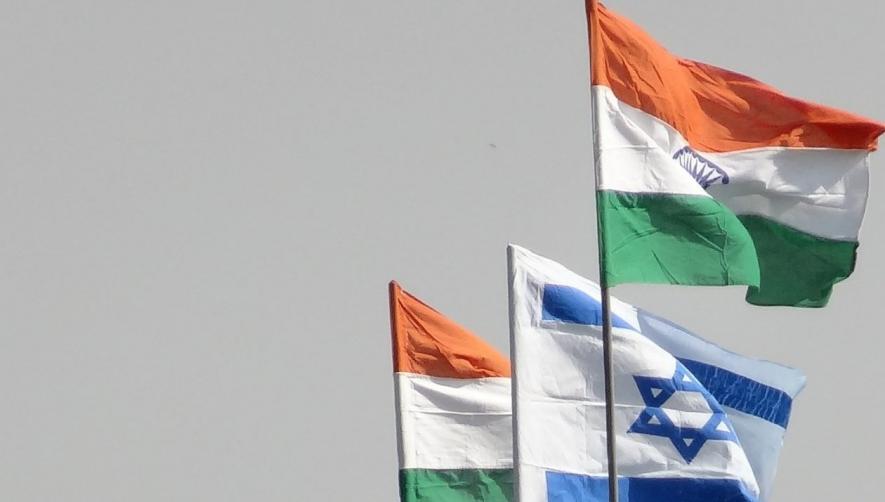Modi in Israel: #NotinMyName

Modi in Israel, Image Courtesy: southasianvoices.org
RAMALLAH: When the #NotInMyName hashtag spread across India’s streets and social media, it felt dauntingly familiar to me: The ever growing number of Jews around the world that protest Israeli atrocities and apartheid against the Palestinian people hold up the very same placards. This is not a mere coincidence of slogans but reflects the deep common interest that connects the Palestinian struggle with India’s pursuit of a secular and democratic state for all its people.
On the eve of Prime Minister Narendra Modi’s visit to Israel, as the first Indian prime minister to do so, it is important to understand that India’s growing ties with Israel are not only devastating for the Palestinian people but for much of India as well.
PM Modi’s visit has been long in the planning but comes at a truly inopportune time. This June, Palestinians marked half a century of Israel’s military occupation, which has denied them their freedom, justice and dignity. It has been 70 years since Israel was established through the ethnic cleansing of indigenous Palestinians from their land, in what Palestinians know as their Nakba (‘catastrophe’), a policy Israel continues to pursue until today.
June marked also 10 years of Israel’s blockade of the Gaza Strip. The tiny strip of land has 2 million Palestinians living under siege, where Israel bars persons and goods from entering or exiting, fishermen are not even allowed to fish without risk of harassment or death by the Israeli navy and Israeli drones hover daily above watching each step Palestinians take.
In the West Bank, 15 years have have passed since Israel begun construction of an 8 meter high, 700 km long concrete wall encircling the Palestinian urban areas in West Bank cutting Palestinians from their lands and the rest of the world.
The inhumanity of Israel’s occupation should be reason enough for any Indian government to maintain India’s long-standing policy of solidarity with Palestinians, which for decades has meant no high-level visits to the country. When hardly anybody knew about the Palestinian cause, India stood in solidarity as it struggled for its own liberation from British rule. Now Modi is reversing this long-standing foreign policy, at a time when even Israeli top politicians recognise the deepening global isolation caused by their apartheid policies.
All moral considerations aside, openly embracing Israel should at least offer India some positive outcomes but even such pragmatic long term benefits seem at the very least questionable.
Apartheid is bad business
The Palestinian civil society call for boycotts, divestment and sanctions (BDS) launching a global movement of conscientious people 12 years ago and inspired by both, the South African anti-apartheid struggle and the Indian legacy of boycotts during the freedom struggle, is gaining daily ground. Almost half of US citizens favour sanctions on Israel, over 40% of the UK's population consider boycotts and sanctions against Israel reasonable. Major multinational corporations are leaving Israel because the cost of boycotts already outweigh the profits Israel can bring. The movement has targeted corporations profiting from the oppression of Palestinians to demonstrate that apartheid is bad for business.
French multinational Veolia lost over $20 billion in contracts globally as a direct result of its support for Israel’s illegal settlements before it was forced to quit its Israel operations. Irish Cement and Roadstone Holdings solds its Israel operations in 2015, French telecommunications giant Orange agreed to pay its Israeli franchise almost $50 million to cut ties, both companies saw their profits elsewhere threatened as a result of their presence in Israel. Likewise, investment funds have blacklisted Israeli and international companies involved in the business of occupation. The United Nations are currently drawing up a database of companies supporting the settlements and Indian companies could easily fall into the list.
Indian companies considering business with Israel should know the costs can be high. As with the companies involved with apartheid in South Africa, the reparations to be paid and the boycott risk around the world may turn quick gains in Israel into losses.
India is being used by Israel as an escape route from the growing boycott movement in the West. India should not allow itself to be used to help perpetuate injustice and oppression elsewhere. It owes this to its own history against colonialism and its historic support for Palestinian self-determination.
India does better without Israel
Israel markets itself as benevolent partner to India. While Israel will benefit from cooperation, trade and military agreements, its six million people can hardly be considered an export market for India. The import of Israeli technology in many cases kills support and market for top-end Indian technology. Supported by Israeli and Indian state’s marketing mechanisms, ‘Made in Israel’ beats ‘Made in India’.
Israeli technology and methodology is not only a tool for and product of the ethnic cleansing and oppression of the Palestinian people, it almost inevitably serves to strengthen and exasperate inequalities and injustices wherever it is exported.
While India is still infatuated with Israeli water technology and has just signed a new agreement on water cooperation with Israel, citizens and governments around the world are waking up to this reality. In 2013, a major water purification deal with Israel was cancelled in Argentina when movements denounced that the Israeli ‘solution’ would increase water costs threefold and export water apartheid by supplying drinking water only to the rich areas.
In 2015, Israeli arms manufacturers denounced an impending crisis when exports fell to $4.5 billion. In the aftermath of the 2014 Gaza massacre many countries turned to other suppliers to avoid civil society protests against arms deals with Israel. Unfortunately, India played a major role in saving the Israeli arms industry when it doubled its purchases to $600 million in 2016. India has already spent some $12 billion on Israeli weapons and buys more Israeli arms than the Israeli army or any other country in the world.
India has a special complicity in undermining the Palestinian call for a military embargo against Israel and in sustaining Israeli capacity to continue its war and repression against the Palestinian people.
The irony is that the Indo-Israeli military ties didn't make India any safer - it just diverted public money from spending on health, education, support for farmers and others.
Worse, Modi's embrace for Israeli apartheid brings in more ideological and technological cooperation with institutions that are born to justify and legitimise apartheid and practices that dehumanise, oppress and exclude all those that are not of the correct ethno-religious or ideological category. Israel’s government abounds with ministers calling Palestinians animals, comparing them to cancer and calling for the outright genocide of the Palestinian people, in particular the women so they won’t bear any more ‘little snakes’. Parties nurture direct links with leaders of lynch mobs on the streets. Mayors declare their city off-limits to black people. Academy promotes professors defining rape of Palestinians as a ‘deterrent’ or consider killing civilians ‘reasonable’ while Israeli curriculums promote openly racism and if anybody wants to object, the new ‘ethics code’ for universities will stop you from doing so.
The call from Palestine for boycotts appeals for action of ordinary people and has shown to work in making change in support of justice, freedom and equality. The BDS movement has shown that people do have the power to make a change. Together, we can build a movement to end India’s complicity with Israel's military industry and defend democracy, human rights and secularism in India and worldwide.
It is time to say #NotinMyName to PM Modi’s trip to Israel.
Disclaimer: The views expressed here are the author's personal views, and do not necessarilyrepresent the views of Newsclick
( Maren Mantovani is the international relations coordinator for the Stop the Wall Campaign and the international outreach coordinator for the Land Defense Coalition, a network of Palestinian social movements. She serves on the international secretariat of the Palestinian Boycott, Divestment and Sanctions (BDS) National Committee, the umbrella organization promoting the call for BDS. She has published several studies on Israeli military relations and corporate complicity).
Get the latest reports & analysis with people's perspective on Protests, movements & deep analytical videos, discussions of the current affairs in your Telegram app. Subscribe to NewsClick's Telegram channel & get Real-Time updates on stories, as they get published on our website.
























